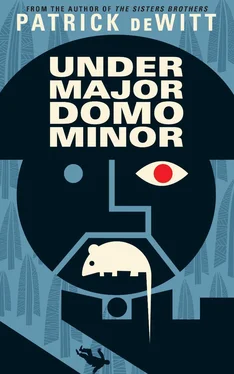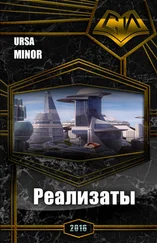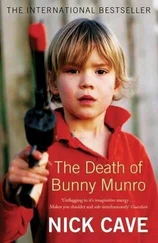Increasingly Klara withdrew, taking walks in the woods for an hour, two hours. Lucy felt an instinctive mistrust of these solitary outings. He asked her,
“Where do you go, when you go into the forest alone?”
“I go into the forest alone.”
“Why do you?”
“To be alone in the forest.”
“But why?”
“Because I want to be.” She looked at Lucy. “You don’t.”
“I don’t want to be any more alone than I already am,” Lucy admitted. He was not proud to say this, and neither was she proud for him.
One day he was buying vegetables at the marketplace when he saw Klara stepping through the crowd and away from the village. She wore a lonesome look on her face, and Lucy followed her. She moved towards the tree line, walking slowly but unhesitatingly; it seemed she had some destination in mind. Lucy might have called to her, but didn’t. When she slipped into the forest, he hurried after.
The sunlight was thinned and the wind dropped away. Klara came in and out of view, disappearing behind trees in the distance, then reappearing. Lucy felt ugly to be spying, and he was made anxious by the fact of it, but he couldn’t stop, and vowed to see it through. Klara entered a clearing, in the centre of which stood a lone tree, a squat and knotty oak, dead and leafless, its branches filled with ravens. As Klara came nearer, certain of the birds rustled, shaking their heads, unfolding and refolding their wings. She stood before the tree; Lucy thought she said some words to the ravens, but couldn’t be sure. When she continued on her way, Lucy resumed trailing her, giving the tree a wide berth, for there was something fearsome about it to him.
Klara walked on and on, and now she was standing before a river, roiling and risen high from snowmelt. When she took up her skirts to sit on the bank, Lucy crept closer, hiding behind a fallen snag, that he might steal a glance at her face and glean just what she was thinking of. The noise of the river was so expansive that it pushed through Lucy, vibrating in his chest. People think of a river as a body of running water, when in truth its physical properties are secondary to its sound.
Klara was watching the sleekly slipping surface of the river, and her face had gone cloudy. Soon she began to weep; she did this openly, frankly, and without shame. In watching this transpire there appeared in Lucy’s mind the knowledge that the life she and he were sharing was finite. Its rareness was its leading attribute, after all, and such a thing as this couldn’t be expected to carry on forever. A feeling of gratitude was born in him; and it was so powerful as to produce a sensation of lift. In a little while Klara dried her face and stood, walking back in the direction she’d come. Lucy ducked as she passed, and afterwards sat alone for long minutes. Something went mute in his mind as he walked away from the river.
He was moving into the clearing when he stepped on a branch; it snapped crisply in the air and the ravens, as a body, burst skyward. This produced a noise so unexpectedly large, and so violently whole, that it seized his spirit in terror. It was as though some centred part of him had come loose, and it ached, and made him fretful.
There was a heaviness to Klara’s movements that night, and she lay with her back to Lucy. His own slumber was troubled and erratic, so that he overslept, awakening late in the morning. Klara was no longer in bed, but in the front room Lucy found she had laid out a pot of tea, a thick slice of bread, a jar of honey, and an apple, peeled and cored. The apple was crisp and tart; the tea had some trace of pine in it. He thought of Klara preparing his breakfast while he slept. A channel of sunlight entered the window, angling sharply to the floor, like a propped beam of milled timber. Dust floated amiably in this, then drew or was drawn into the surrounding darkness, which brought to mind the image of shifting tides. How quiet Lucy’s life was just then. He thought he had never been quite so melancholically happy as at that moment.
Clearing the table, he cleaned, dried, and stacked the dishes. The whistle of the morning train sounded down the valley, which meant he had twenty minutes to fetch the Baron’s letter and deliver it to the platform. He sat and pulled on his boots, and was lacing them when Klara burst in, short of breath, a bright look on her face.
“Didn’t you hear the train?” she asked.
“I heard it.”
“Well, get to work, you lazy man!” She pulled him up by the lapels and kissed him. Her smile was easy, and she gripped Lucy’s waist, pressing in close to him. Whatever it was that had been bothering her had been set aside; she had made some decision, and this was in Lucy’s favour. Pushing him out the door, she told him to return in time for dinner, and he said that he would. As he walked through the village he was so pleased, so relieved, because there was nothing the matter with his Klara, and all was well between them. This feeling of comfort was short-lived, however: passing the marketplace, the wily butcher approached him in the road, and said, “Shame about Adolphus, eh?”
“What about him?”
“You haven’t heard? He’s been taken prisoner.”
“How do you know?”
“I met one of his men on the mountain, and he told me all about it. Said Adolphus was shot in the gut, and so the others caught up to him and pulled him away. He was trailing blood, and never had any hope for escape. If he lives they’ll only hang him, I imagine. Now what do you make of that?”
“I don’t know what.”
“I would think you’re happy about it, eh?”
“No. I don’t know.” Lucy didn’t like the wily butcher for saying such a thing, even if it was true; and he felt a creeping brood coming on, for surely the news of Adolphus’s capture was the reason Klara had been weeping. And even though she appeared to have reconciled herself to its happening, Lucy knew this was not the last he would hear of it. What a violent thing love is , he thought. Violent was the word that had come to him.
Lucy stood on the platform with the Baron’s daily missive. He was feeling sad-hearted, and his mind wished to wander to its darker corners. As the train approached, the familiar hand emerged, only there was something quite different about the appendage on this morning, which was that it held a letter of its own. The incongruousness of this was such that Lucy failed to lift his own letter, but merely stood by gawking at the flapping pink envelope in the engineer’s fist. As the train passed, the engineer dropped the letter, and Lucy watched it twirling through the air. When it came to rest down the platform, he cast the Baron’s letter to the ground and hurried to scoop up this other, making for the castle at a dead run. As he wended his way up the hill, the engineer sounded his horn, a half-dozen staccato blasts. Of course he had been reading the letters all along, before Lucy was, even.
Lucy found Agnes cutting Mr Olderglough’s hair in the scullery, the latter sitting sheet-wrapped in a low-backed chair, while Agnes stood at his rear, scissors poised. Here was a scenario smacking of the domestic, so that Lucy felt the intruder; and indeed, his superiors wore the look of the intruded-upon, but he offered not so much as a passing apology, as there was no time to linger over societal faux pas. He pressed the letter into Mr Olderglough’s hand. “She’s written, sir,” he said.
Mr Olderglough studied the envelope: front, back, front; he peered up at Agnes, and nodded. He opened and read the letter, sternly, and with the index finger of his right hand pointed upwards. When he finished, he stood away from the chair to pace the room, addressing Lucy and Agnes in an earnest monotone. “The Baroness will arrive here in twenty days’ time,” he said.
Читать дальше












